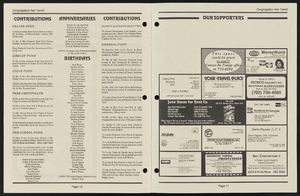Search the Special Collections and Archives Portal
Search Results

Photograph of Bill Braire and Oran K. Gragson standing in front of the stairs to TWA flight 819, circa 1960s
Date
Archival Collection
Description
Image

Charlotte Pittman oral history interview: transcript
Date
Archival Collection
Description
Oral history interview with Charlotte Pittman conducted by Vanessa Concepcion, Cecilia Winchell, and Stefani Evans on November 29, 2021 for Reflections: The Las Vegas Asian American and Pacific Islander Oral History Project. Charlotte discuses her heritage and family's histories as well as her childhood growing up in Manila, Philippines with her cousins and Lola (paternal grandmother). She talks about immigrating to the United States and growing up in Pueblo, Colorado before attending the Air Force Academy to become a pilot and moving to Las Vegas with her husband. Charlotte also shares memories from her time serving in the Air Force, her plans to retire in the near future, and her current activities with her family.
Text
Las Vegas Art Museum Records
Identifier
Abstract
The Las Vegas Art Museum Records (1952-2009) contain administrative files, press, marketing materials, and scrapbooks that document the history of the Las Vegas Art Museum (LVAM). Collection materials include exhibition files, annual reports, financial statements, board meeting agendas and minutes, event invitations, press releases, and newspaper and magazine clippings documenting the museum's activities. Materials include photographs from museum events as well as photographs of artwork displayed as part of visiting and permanent exhibitions. Audio and video recordings include interviews with museum staff and local news coverage of events. Also included are architectural floor plans for the Sahara West Library, which was used as a gallery space for LVAM. Digital files in this collection include recordings and presentation slides from LVAM lectures with curators and artists. Other digital files include photographs from LVAM events and workings files from LVAM staff.
Archival Collection
Jimmy Lee oral history interview
Identifier
Abstract
Oral history interview with Jimmy Lee conducted by Vanessa Concepcion, Kristel Peralta, and Stefani Evans on May 25, 2021 for Reflections: The Las Vegas Asian American and Pacific Islander Oral History Project.
Jimmy shares his family's history as entertainers and producers in Korea and their migration to the United States when Jimmy was six years old. He talks about their move to Durham, North Carolina and their relocation to Las Vegas, his education, and his current business, mentorship, and philanthropic pursuits.
Subjects discussed include: Arirang Sisters; Jo Mackey Sixth Grade Center; Nevada's tax structure; Commercial Center
Archival Collection

Ashley Vargas interview, October 30, 2018: transcript
Date
Archival Collection
Description
Interviewed by Laurents Banuelos. Elsa Lopez and Claytee White also participate in the questioning. Ashley Vargas, also know by her stage name Ms. Aye Vee is a Las Vegas native born and raised. She has received notoriety in the Las Vegas valley for her raw story telling and poetry. Vargas identifies as an Afro-Latina Puerto Rican. She spent her childhood growing up on the Eastside. She vividly remembers having to navigate several spaces in order to survive the rough neighbors she was in. Today, Vargas uses her poetry to communicate her experiences and set ups workshops to help cultivate young up and coming writers. Please note the following disclaimer: This interview contains language that some may find offensive.
Text

Transcript of interview with Jackie MacFarlane by Claytee White, February 4, 2010
Date
Archival Collection
Description
Jacqueline "Jackie" Tilman MacFarlane was born in her grandmother's Las Vegas home at H Street and Clark Ave. Her father John Franklin Tilman was a construction worker at Boulder Dam (now Hoover) in early 1930s. Jackie recalls her family having to move several times the Great Depression and living in rural Nevada. Eventually the family came back to reside in Las Vegas. After graduating from high school, she took a waitress job at the Spot Cafe (Main & Charleston) and then at the Askew Drive-In. It was there that she met her future husband, David MacFarlane, an Air Force cadet. David continued to work at Nellis Air force Base as a civilian until he retired in 1987. Jackie describes raising her children in Fair Circle neighborhood during the 1950s and 1960s; a time when Las Vegas was just a "small town of 50,000." She felt safe and always found work in the casinos. Her work career included being a change girl at the Mint of Fremont St. and working as the front office cashier at the Desert Inn and then working at the Sands Hotel and Casino. Eventually she became a night auditor at Sands Hotel and Casino and then at Sahara Hotel and Casino from 1970-1977. She remembers working nightshift, coming home to get the kids and husband off to school and work. After leaving Sahara, she began selling Vanda cosmetics as a home business, something she still does today.
Text

Transcript of interview with Don Ross by Barbara Tabach, February 15, 2017
Date
Archival Collection
Description
At the time of this interview, Don Ross has devoted nearly four inspirational decades of his life in the hotel and hospitality industry. In December 1987, at the age of 29, he accepted a position with Caesars and is now the Vice President of Catering, Conventions & Events for Caesars Palace Las Vegas. Don shares personal stories that lead to his “Don-mode” of providing a high level of customer service. From experiences with his grandparents to an extraordinary upbringing in his parents’ business, Green Chimneys, in Brewster, New York, Don received a surprisingly well-rounded educational foundation. As Don discovered his natural innate ability to serve others in the hospitality industry, he thrived and has never looked back. In recent years, his leadership talents and giving nature have been honored. In 2009, he was one of three distinguished industry executives recognized for their exceptional contributions to the hospitality industry as an “Industry Executive of the Year” during UNLV Harrah College of Hotel Administration’s 5th Annual Vallen Dinner of Distinction. Over the years, he has been honored for his work with Opportunity Village, his Jewish community involvement, and his continued work with Green Chimneys among many other organizations and causes.
Text

Transcript of interview with Martin, Linda, and Robert Wilner by Barbara Tabach, May 10 & 24, 2016
Date
Archival Collection
Description
During the early 1970s, the boom of Las Vegas included many single people following family who had already settled there. Among those was Martin (Marty) Wilner. Marty?s parents were Leo and Mickey Wilner. Leo moved to Las Vegas to become the Executive Director at Temple Beth Sholom, the only synagogue in town. Marty, who was born and raised in California, had recently earned his doctorate in psychology at the University of Houston. He became a counselor at UNLV. Not long after, Marty met Linda at a Jewish Singles event. Linda was a divorced, mother of three children, who had moved from California to find comfort in living near her parents. Robert Wilner is one of her three children. He was adopted by Marty and works with his mother in the real estate business. In this interview, they recall together the Las Vegas of the 1970s. For Robert, he remembers his bar mitzvah, and growing up with Jewish friends under the careful eye of his grandparents. As an adult, he has enjoyed a successful career as a real estate agents working with his mother. For Linda, the success of real estate was being part of one of the most robust housing markets in the country. She and Robert recall an extensive list of visionaries who developed the valley, as well as the inherent challenges of water, unions and maintaining their high level of ethics.
Text

Transcript of interview with Bruce Isaacson by Barbara Tabach, March 24, 2017
Date
Archival Collection
Description
Bruce Isaacson was born in 1956 in Castro Valley, California to Betty Griffin and Bernard Isaacson, and spent his childhood in Oakland. He received his bachelor?s degree from Claremont McKenna College with majors in economics as well as drama, and continued studying for his Masters of Business Administration at Dartmouth College. After receiving his MBA, Isaacson started a career in finance, focusing on mergers and acquisitions. In 1995, he moved to Las Vegas to pursue a real estate career alongside his father. In June 2015, Isaacson became Clark Country?s first poet laureate to encourage poetry as an art form in Southern Nevada. Although Isaacson began writing poetry at a young age, he wanted to develop his craft further. So he attended Brooklyn College for a Masters of Fine Arts and studied with famed poet Allen Ginsberg. Isaacson is known in the San Francisco Bay Area as organizer and poet in the Cafe Babar readings in the 1980s. He is also a co-founder of Zeitgeist Press, where he remains publisher and co-editor. In this interview, Isaacson discusses his childhood and how he maneuvered his career path from finance into poetry. He talks about applying for and serving as the county?s first poet laureate, and describes the programing he?s started in this capacity. Isaacson also speaks about his earlier involvement with Bay Area poetry scene as well as the impact of his Jewish upbringing on his life and his art.
Text

